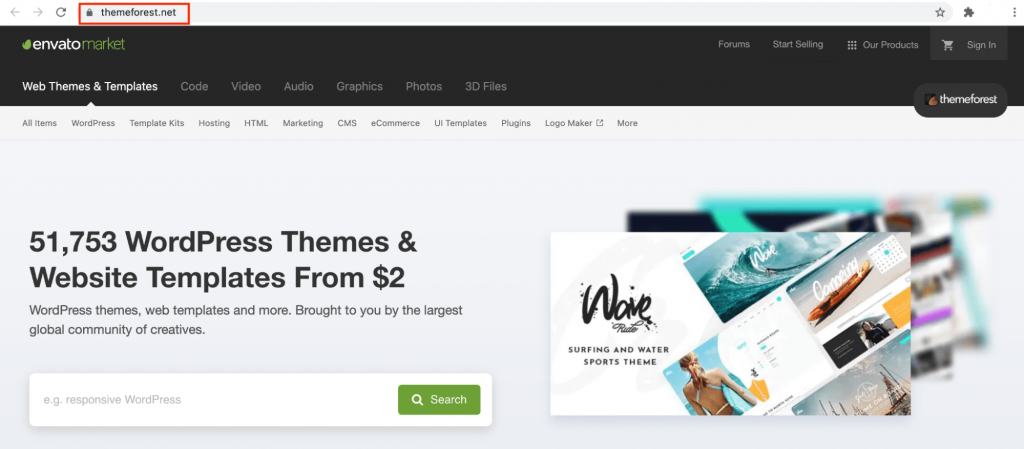.com vs .net: key differences between these domain extensions

A domain name serves as your website’s address on the internet – it’s what people type in their browser to find you online. When users enter your domain, they’re connected to your web hosting server where all your site’s files and resources are stored.
Every domain consists of two key parts: the name and the extension. For example, in our address hostinger.com, “hostinger” is the domain name while “.com” is the extension.
While thousands of domain extensions existf today, .com and .net remain the most popular choices for businesses and organizations. Originally, .com was designed for commercial entities, while .net was intended for network-related services. But do these distinctions still matter today?
This guide will explore the key differences between .com and .net domains, examining their advantages, limitations, and ideal use cases. By the end, you’ll have the insights needed to choose the perfect domain extension for your specific goals and audience.

What is a domain name extension?
A domain extension, also known as a top-level domain (TLD), is the final segment of a domain name that appears after the last dot. For example, in “example.com,” the “.com” portion is the domain extension. These extensions serve as categories that help organize the internet and provide information about the type of website you’re visiting.
Domain extensions were originally created to classify websites based on their purpose or geographic location.
While .com (commercial) became the most recognized extension worldwide, others like .org (organization), .net (network), .edu (education), and .gov (government) were designed for specific types of entities.
Today, hundreds of specialized extensions exist, from industry-specific options like .tech and .store to country-code TLDs like .uk (United Kingdom) and .jp (Japan).

In addition to gTLDs, there are also country-code top-level domains (ccTLDs). A ccTLD represents the country the company or website is based in, such as the .at domain for Austria and .in for India.
Note that you don’t have to use a ccTLD just because you live in a certain country or have a business presence there. However, having a ccTLD usually makes it easier for customers to find local businesses.
Moreover, since some ccTLDs are homographs of common abbreviations, they are no longer associated with certain territories and have grown to be used as generic. For example, .cc domains were originally assigned to the Cocos (Keeling) Islands. The .tv extension was initially used as a ccTLD for the Polynesian island nation of Tuvalu.
.com vs .net – main differences
Since both .com and .net are generic top-level domains, many people assume that they’re interchangeable. Knowing the difference between .com vs .net domain extensions is essential to choosing which one is best for you.
.com is the most popular domain name extension, used on 44.4% of the websites on the internet. That’s because it mainly represents commercial intent, and for many people it’s the most familiar one.
If a customer wants to find your website, their first option will certainly be yourbrandname.com. Thus, .com is a domain name extension suitable for all types of online businesses, from ecommerce sites to blogs and corporate pages.
On the other hand, a .net domain extension isn’t as generic as a .com domain. Businesses that use .net extensions are mostly network services, database providers, and technology companies, such as ThemeForest.
.com vs .net – pros and cons
If you’re still debating between using .com vs .net, make sure to factor in the advantages and disadvantages that each may bring to your website. To help you out, we’re going to compare .com vs .net domain extensions in this section.
When it comes to using .com domain extensions, the main pros are:
- Memorability – As the internet’s most recognized extension, .com domains are what users instinctively remember and type. When someone hears your brand name, they’ll naturally add “.com” when searching for you online.
- Credibility – A .com extension instantly communicates professionalism and business legitimacy. Studies show consumers trust .com domains more than alternative extensions, giving your brand an immediate credibility boost.
- Accessibility – Many mobile keyboards feature a dedicated .com button, making your website address easier for visitors to type on smartphones and tablets, which is critical in today’s mobile-first world.
- Affordability – Despite its premium status, a .com extension remains remarkably cost-effective at just $9.99/year, offering exceptional value for the brand recognition and trust it provides.
However, there are a couple of cons to consider:
- Unavailability. It can be tough to find a domain name with .com available, as many websites already use it. As a result, you may need to look for a different domain name. Domain name generators can help you come up with an idea.
- Too generic. If you provide services in a specific location or language, it might be more interesting to use a country-code top-level domain. It will help potential customers know that your business caters to their region.
Domain Name Checker
Instantly check domain name availability.
As for the .net extension, some of its benefits include:
- Technology Credibility – The .net extension immediately signals your connection to technology, networking, or internet services. For IT companies, web hosting providers, and tech startups, this extension perfectly aligns with your brand identity.
- Greater Name Availability – With .com domains increasingly scarce, .net offers significantly higher chances of securing your ideal domain name. This allows more flexibility in choosing a name that perfectly matches your brand.
- Industry Recognition – For networking companies and technology providers, a .net domain creates instant association with your field. Customers seeking technical services often have positive associations with .net extensions, viewing them as specialized and authoritative.
On the other hand, using a .net domain name also has its cons:
- Niche Perception – The strong association with technology and networking can limit .net’s effectiveness for businesses outside these sectors. Non-tech companies may find that a .net domain sends mixed signals about their brand identity.
- Higher Investment – If the domain name cost is your concern, at $12.99/year, .net domains come at a premium compared to .com. Consider bundling with a hosting package that offers free domain registration to optimize your budget while still benefiting from this specialized extension.
Domain names and SEO
Search engine optimization (SEO) is another factor that you need to consider when choosing a domain name extension.
The truth is, your chosen extension won’t significantly impact your rank on Google or other search engines. You might have heard that .com has the most positive impact on your site’s ranking. However, other extensions like .net have an equal chance to rank well.
There’s one exception to this rule. Geo-specific extensions like .uk and .in will impact search rankings on the local level. The reason behind this is that audiences are more likely to click on the site when the domain name contains their country code.
However, owning a ccTLD is only possible if your business manager and the domain’s administrative contact reside in that specific country. In this case, secure your main domain extension along with the ccTLDs to expand your reach in target areas.
Experts advise including relevant keywords in your domain, such as mycakeshop.com instead of myshop.com. People who see your domain name will immediately know what your company is about. That’s more important than the domain extension alone.
So, if you want to increase your visibility on search engines, the best practice is to invest in a sustainable SEO strategy that goes far beyond the domain name.
When to use .com domain names?
The .com domain extension represents a professional entity that does business online. Due to this, the suffix .com is highly valuable from a branding standpoint.
It does not mean, though, that only for-profit companies are eligible to use .com. If you’re a non-profit organization, you can use a .com domain name to sell items or promote events to raise funds for your cause.
Today, the use of .com is more general in scope. Aside from a business website, a personal blog and a portfolio site can also go with the .com domain extension to improve their online presence.
When to use .net domain names?
There are situations where you might want to use a .net domain name rather than .com to better reflect your website’s purpose.
A .net domain extension is best for websites that operate in the technology and networking field. It helps the audience understand what your business is by simply looking at your domain name.
An example is Slideshare.net, which is a networking platform for sharing pre-made slide designs, infographics, and other professional content.
So, as long as .net represents your business purpose, you can use it as a domain for your site.
Moreover, 2.4% of websites have the .net domain name. Since fewer websites use it, opting for a .net extension will make your domain more unique.
Do you need both extensions?
To protect your site, consider acquiring .com as well as .net. This way, you’ll reduce the risk of competitors using a domain name very similar to yours and even capitalizing on it.
Customers might go to yourbusiness.com instead of yourbusiness.net, believing they’re at the right place.
Typically, this kind of scheme attacks larger-scale sites. Malicious third parties might even ask you for a large sum of money in exchange for the imitated site.
Aside from security, having multiple extensions will help increase your site traffic. Even if customers enter your site from a .net domain name instead of a .com, they’ll still be redirected to the same page.
Domain Name Checker
Instantly check domain name availability.
Thus, check both .com and .net options and purchase both domains if possible.
One more thing you should be aware of is that your contact details might be visible through WHOIS lookup tools. To protect your personal data, consider implementing domain privacy protection.
Conclusion
Both .com and .net are viable domain name extensions for business websites, but remember to keep their differences in mind before getting yourself a domain.
The .com extension is designed for general use – specifically for websites that make money online. For that reason, it’s a widely used extension, so it might be more challenging to find a .com domain extension available. Even if your preferred domain name is taken, you can try to find out who owns it and, who knows, they might be persuaded to sell it to you.
On the other hand, many technology experts prefer to use a .net domain extension as it is more fitting for businesses that deal with technology and other internet services. Compared to .com, it’ll be easier to find a .net domain name for your website.
When it comes to SEO, there’s no difference between .com vs .net websites. Your overall SEO strategy is more important for Google and other search engines than the domain extension itself.
We hope this article helped you understand when to use .com vs .net domains. Make sure to register your domain while it’s available by purchasing it through a domain name registrar or together with your web hosting plan.
Got your domain name?
Check out the next steps to creating your site in our guide I Bought a Domain Name, Now What?
.com vs .net FAQs
Are there any restrictions on .com or .net domains?
There are some restrictions on .com and .net domains, but they are generally minimal. These domains are open for registration by anyone without any specific requirements. However, domain registrars and registries may have their own policies and restrictions regarding trademark infringement, abusive behavior, or illegal activities.
Is .com better than .net for SEO?
Neither .com nor .net domains have an inherent advantage for SEO. Both can rank well in search engines if optimized correctly. The choice between .com and .net should be based on the relevance to your business, availability, and brand preference rather than SEO considerations.
Which one, between .com vs .net, should I use for my business website?
For a business website, .com is generally preferred due to its widespread familiarity and credibility. It is the most recognized and commonly used domain extension. However, if your desired .com domain is not available, .net can be a viable alternative that still conveys a professional online presence.
All of the tutorial content on this website is subject to Hostinger's rigorous editorial standards and values.



